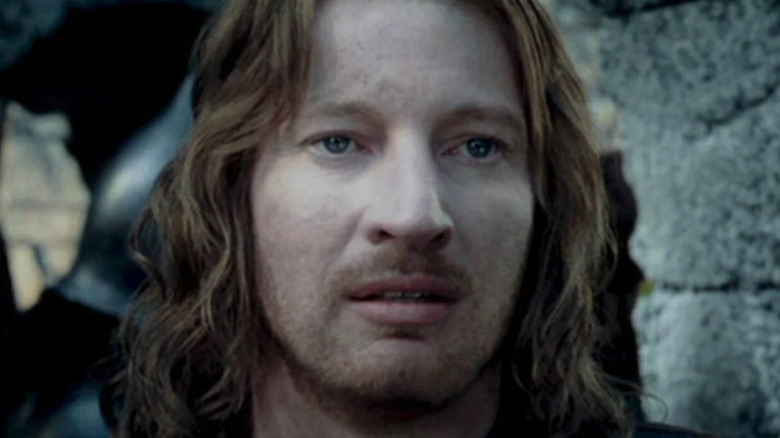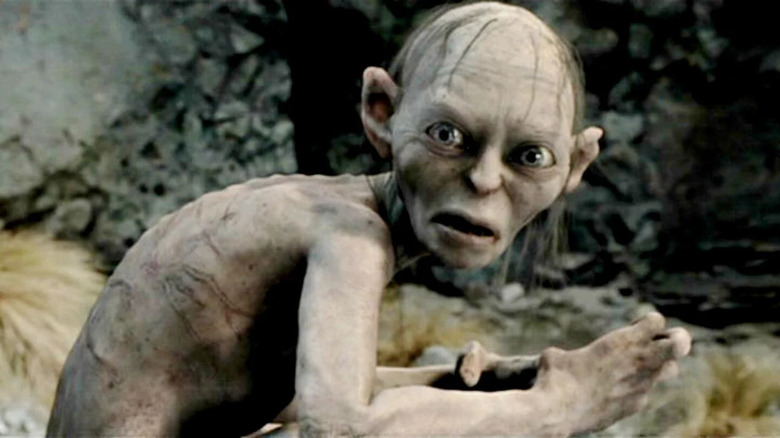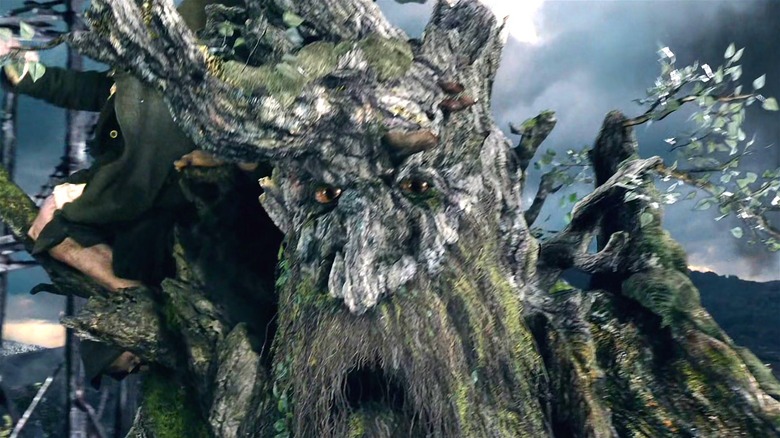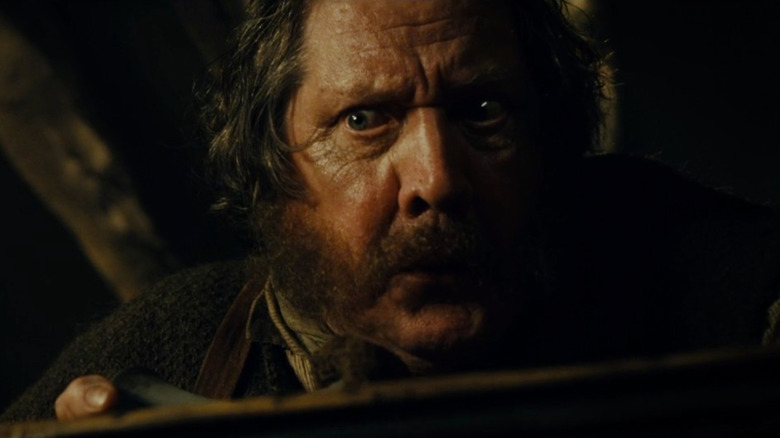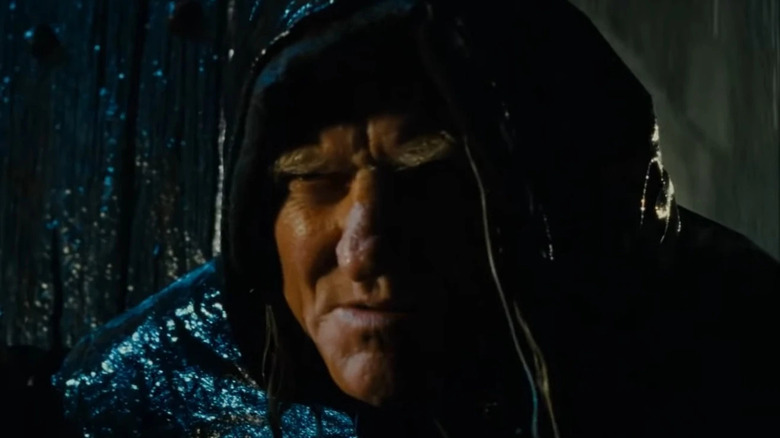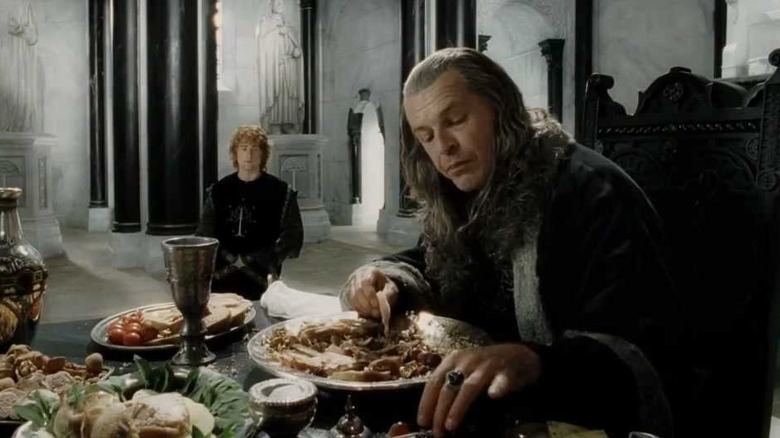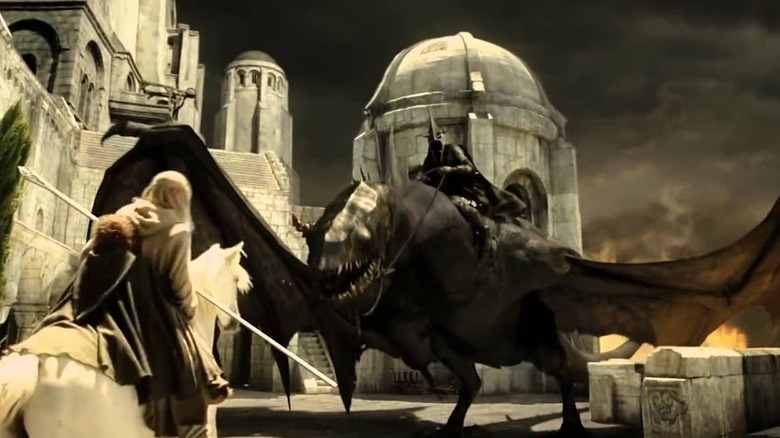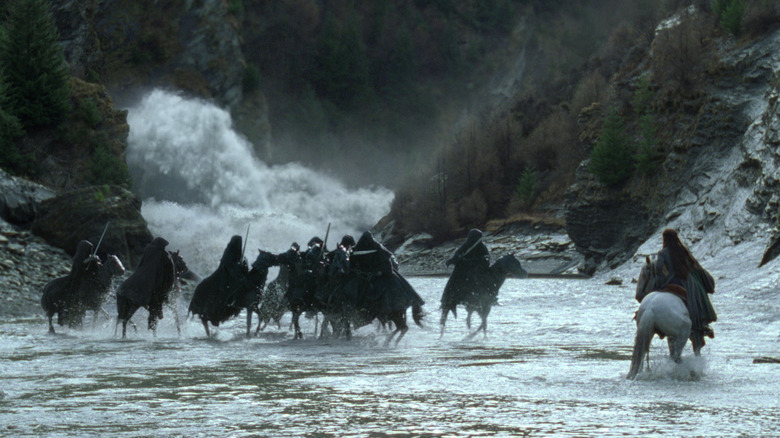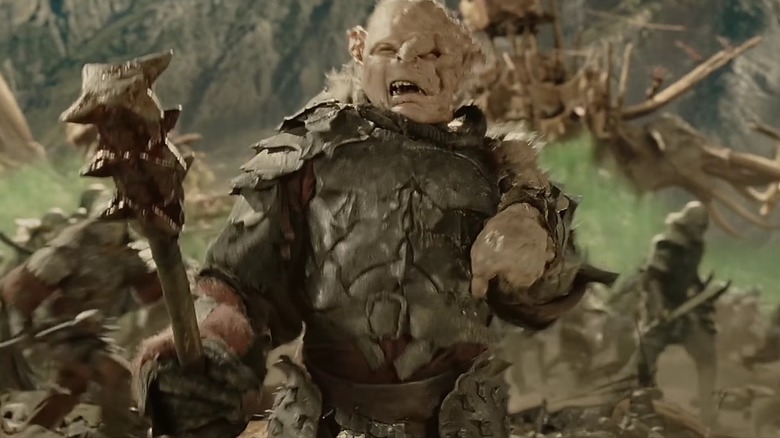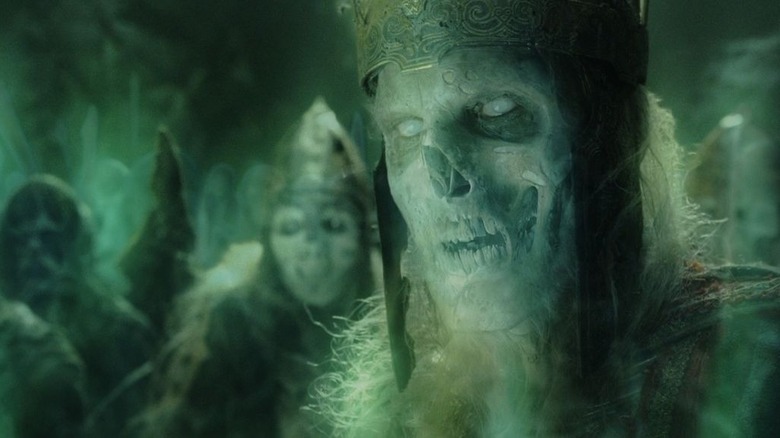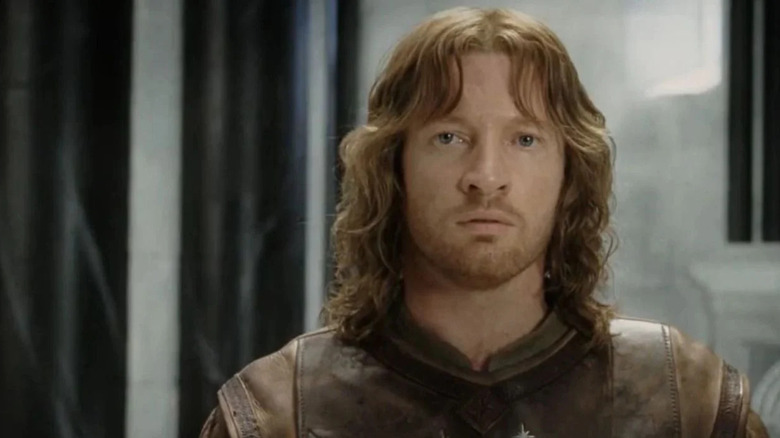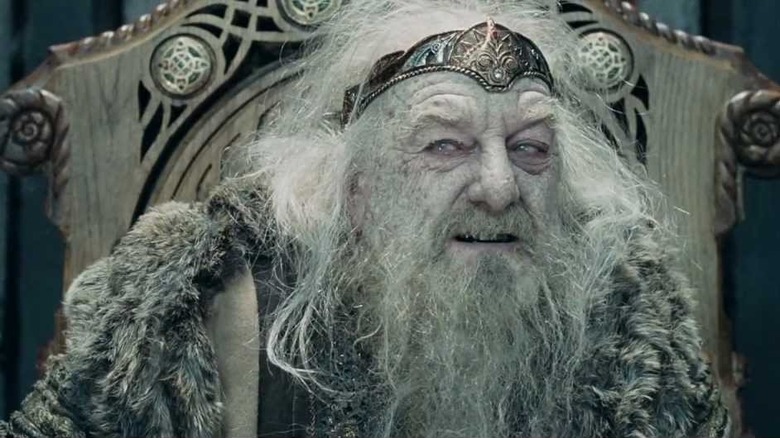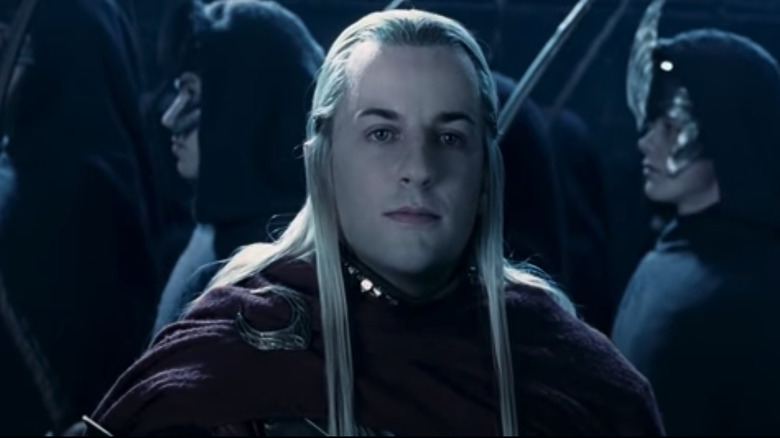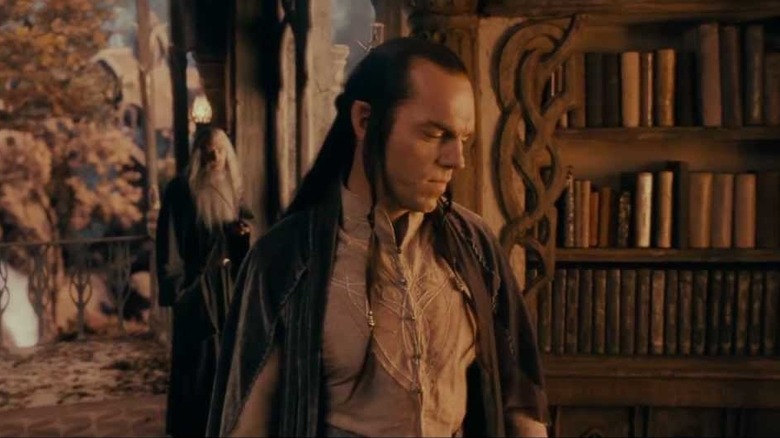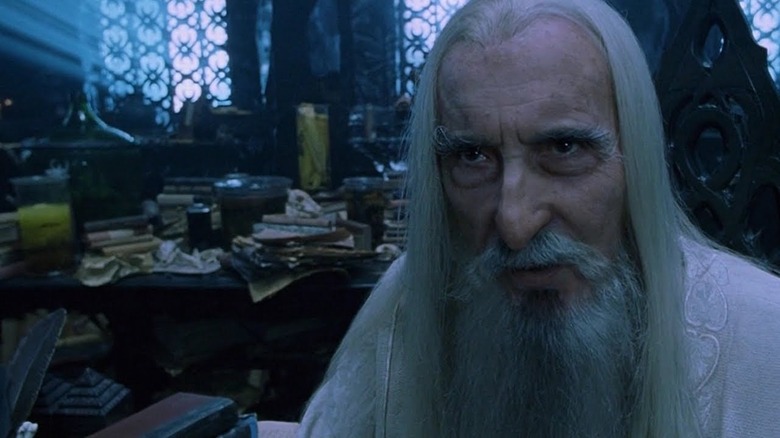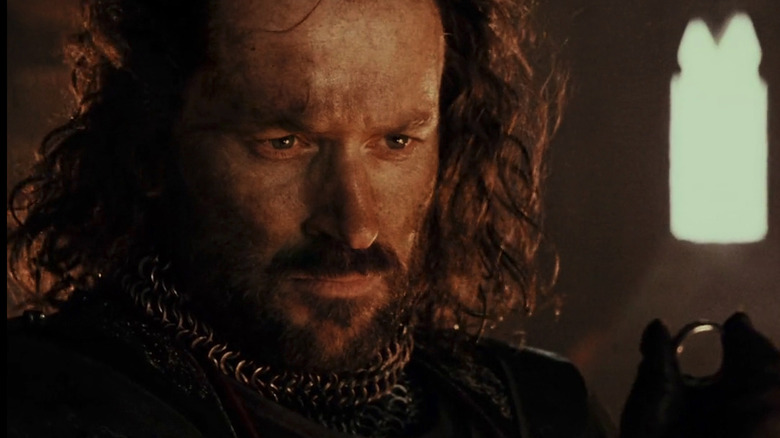Popular Lord Of The Rings Characters We Wound Up Hating By The End Of The Movies
Movie adaptations are a tricky business. They involve translating characters — often beloved ones — from non-cinematic source material into a sweet and condensed movie format. Even for something as massive as the nearly 12-hour extended edition of the "Lord of the Rings" trilogy, there's still a lot of truncating and changing going on to fit the characters into a shorter on-screen story.
This process can end in both success and failure. In the case of "The Lord of the Rings," some characters pop, like Viggo Mortensen's Aragorn. While very different from the book, Mortensen's version of the character is powerful, moving, and iconic. For every great character interpretation, however, there are going to be others whose stories flame out — individuals who end up disliked by the audience even though many of their story arcs start out strong. This eventual antipathy can stem from a number of factors. Unfaithful adaptation, untapped potential, limited screen time, and horrible in-story character development are some of the primary offenders.
By the time the credits roll, viewers aren't particularly happy with any of these characters. At least, not with where they finish their stories. With all that in mind, here's a list (in no particular order) of characters from Peter Jackson's "The Lord of the Rings" trilogy who wound up being intensely disliked.
Gollum hits rock bottom by the end
Yes, we're starting with Gollum. And yes, a lot of people like this guy. Sméagol is cute. The whole back-and-forth thing between Gollum and Sméagol is entertaining, if a bit unsettling. Andy Serkis might as well be the king of the performance-capture world, and he's fantastic as Gollum. But we're talking about where characters end up at the end of their stories, and the answer to that question for Gollum is in a lake of molten lava.
Sméagol has an admittedly pitiable story. When "The Lord of the Rings" starts, he's a sad antagonist unwillingly driven by his desire for the One Ring. Then, in "The Two Towers," he's tamed by Frodo and starts to show signs of overcoming his malice. The Sméagol side seems like it has the upper hand, and for a moment it looks like it might even win. But by the time the story ends, Gollum has a full relapse. He tries to treacherously deliver his master to a monstrous arachnid. He knocks Sam out with a rock and bites Frodo's finger clean off. The story couldn't end happily if it weren't for his little tumble off the ledge of the Cracks of Doom, but there's no doubt that Gollum's likeability factor decreases toward the end there, dropping steadily until it hits rock bottom in the depths of Mount Doom.
The Entish story is mangled
Everyone loves the Ents. How could you not? They're a clear representation of Tolkien's love for nature. They're also a dig by the author at William Shakespeare. That's right, in a letter to a friend, Tolkien pointed out that the Ents answered a long-unfulfilled desire in him for the moving forest at the end of "Macbeth" to be actual, real-life trees.
Clearly, there was a lot to live up to when Peter Jackson and company adapted the Ents for the big screen. The results look fantastic, and the Shepherds of the Trees are involved in some pretty exciting scenes. Treebeard starts out strong, too. He crunches an orc or two and then nearly squashes Merry and Pippin before he realizes that they're friends, not foes. They then head to Entmoot, where they end up ... not going to war? It's only the timely redirecting of the Hobbits that ends up changing their minds, as Treebeard seems bafflingly ignorant of Saruman's destruction of the forest.
This is all hogwash and a complete deviation from the original text. In the book, the Ents agree from the very slow, drawn-out jump that they must go to war. They march straight to Isengard and lay waste to Saruman's fortress. The indecision in the movies completely derails their story and their sudden change of mind doesn't help anything. It just doesn't fit, and the whole ordeal leaves a bad taste in the mouths of anyone familiar with the books.
Barliman Butterbur changes from a hero to a coward
In the "Lord of the Rings" books, Barliman Butterbur is a jolly, round-faced innkeeper in the crossroads village of Bree. He runs the Prancing Pony, and he's a guy who knows a lot. Gandalf trusts him. Aragorn respects him. What else is there to say? The guy's pretty cool.
When Frodo and his friends arrive in Bree on a rainy night in the "Fellowship of the Ring" movie, they're greeted by the innkeeper, who acts a bit surprised when he hears that Frodo's name is Underhill. In the book, this is because he's already been told by Gandalf that Frodo would be traveling under that name, even though in the movie, it's never clarified. Anyway, Butterbur puts them in a room, tells them who Aragorn is, and then has no further influence on the story. Zero. Zip. Nada. The last thing we see is him cowering by the door while the Black Riders boldly march into his establishment and hack some of his beds to bits.
The Barliman Butterbur of the movies is a pitiable character. He's way out of his element, and he's just a busy innkeeper trying to keep his guests happy. Then he becomes a terrified victim of the Nazgûl as they hunt for the Ring. When that's compared to the bolder innkeeper from the book, who's a friend to Gandalf and does his best to help Frodo and his friends, it leaves a lot to be desired.
Harry Goatleaf is a villain with no story
Another Breelander who doesn't get his due in the "LOTR" franchise is Harry Goatleaf. Goatleaf is a gatekeeper at Bree. That's right, he's the guy we see pop his head through the little door in the gate and suspiciously let Frodo and his friends through as they're being chased by Black Riders. A little while later, in a bit of dark humor, the gatekeeper is mowed down by the Nazgûl, who literally ride through the blockade as if they're driving a tank instead of horses. In the book, this kind of happens, but when Gandalf, not Frodo, is in Bree.
The character adaptation of the gatekeeper suffers from two things: A lack of importance and a lack of screen time. In the book version, Goatleaf isn't especially important, but he's certainly more involved. He gives the Hobbits a more difficult time getting into Bree. He also talks with the Black Riders and appears to be operating as one of their agents. Later on, in "The Return of the King," it's revealed that Goatleaf helped cause trouble in Bree and likely in the Shire as well. While we don't get many details, it's known that he breaks bad and runs away from Bree, never to be seen again.
At the end of the day, Goatleaf is a minor character who plays a pretty negligible role. But to reduce that part to a quick conversation before getting Nazgûl-slapped into extinction is an adjustment that makes the character feel even more pointless.
Denethor is cracked - too cracked
Denethor is the Steward of Gondor. He's technically only meant to maintain Gondor until the long-lost king returns, but functionally, Denethor is one of the most powerful people in Middle-earth. The hosts of Gondor are at his command, and he's the descendent of a long line of ruling stewards.
In the book, Denethor is a very strong-willed character. He has some major flaws — like the whole trying to kill his son thing — but he also has his head on straight for at least some of his decision-making. For instance, he actually tries to protect his kingdom. He makes semi-wise military decisions and shows that he's a ruler to be reckoned with, even when the deck is stacked against him. Eventually, though, his despair (and his ongoing use of his palantír, which is influenced by Sauron) drives him mad.
The movie version of Denethor starts as a stately, impressive leader, but it takes all of two seconds before he begins making some really outrageous decisions. He deliberately tries to get Faramir killed in an insane counterattack and then tells his own soldiers to abandon their posts and flee for their lives. When Gandalf physically knocks him out (an event that never would have happened in the book), things really go off the rails. Even when he dies, Denethor needs to do it by hurling himself off a cliff. The over-the-top dramatics and poor decisions ruin this character long before he meets his doom.
The Witch-king overpowers Gandalf?
The Witch-king of Angmar is an objectively cool character in both the "Lord of the Rings" books and the movies. He's one of the most feared beings in Middle-earth, and Sauron trusts him more than pretty much anyone else. When we first encounter the Witch-king, he's leading the Nazgûl in a terrifying pursuit of the One Ring. They nearly capture Frodo multiple times before the Hobbit even reaches Bree. Aragorn gets in the Witch-king's way later, but even then, the Nazgûl seems nearly unbeatable, especially after walking up to Frodo in his ghostly form and stabbing him in the shoulder with his Morgul blade.
When the Witch-king appears again in "The Return of the King," he's leading Sauron's massive first attack on Gondor. He looks epic mounted on his flying fellbeast, and he's on his way to a perfect character arc by losing an epic duel with Éowyn on the fields of the Pelennor.
But then Peter Jackson went and released the extended version of "The Return of the King," which includes one little scene with Mr. Angmar that kind of ruins his whole schtick. In an added scene, he confronts Gandalf in the ruins of Minas Tirith ... and then shatters the wizard's staff. This is way beyond his power level, and it certainly doesn't happen in the book. The random decision to make him stronger than Gandalf is a poor choice, and one that upset a lot of fans, poisoning the character's reputation in his final hour.
The Nazgûl screech and screech and screech
The Ringwraiths of the "Lord of the Rings" movies sadly get the short end of the stick as the series progresses experiencing a gradual decline into annoyance and apparent irrelevance. When the Nazgûl first show up at the beginning of the trilogy, they're terrifying and awe-inspiring. They're expert hunters who Frodo and even Aragorn can't fully shake until they're washed away in a horse-infused flood.
When they return, the villains are mounted on their new fellbeast creatures, which you might think would take their overall story impact up a notch. But for the most part, they just kind of fly around. Sure, they're scary and all, but apart from knocking a few guys off the walls of Minas Tirith and cultivating a general feeling of dread, they don't do much else in the movies.
And then there's the screeching. From a pure movie-watching experience perspective, the Nazgûl screech becomes absolutely obnoxious as time goes on. By the end of the movies, their presence on the screen may send viewers scrambling for the mute button on their remotes. Two thumbs down.
Gothmog has his own orcish agenda
Gothmog is a character who could have had a lot of potential in the "Lord of the Rings" movies. In the books, he's a very limited villain. He gets one short mention in "The Return of the King," where it says that Gothmog the lieutenant of Morgul takes over after the Witch-king falls during the Battle of the Pelennor Fields.
That's it. It's, like, literally one sentence. We never hear what happens to him or who he is. Heck, we don't even know what kind of creature he is. It's usually suggested that he could be a human man, a Ringwraith, or an orc, but Tolkien never tells us. Peter Jackson, on the other hand, certainly does. He makes Gothmog a weird-faced orc who clearly has it out for the enemies of Mordor. When he enters the scene, there's some potential for an interesting take on a previously underdeveloped character.
But then, not long after his reveal, Gothmog kills a man and starts spouting some random drivel about the age of the orc beginning. This is all out of character and completely made up for the movies. After that, we see him spit on a flying rock that he side-steps — which is admittedly pretty cool — and then he's just mowed down by the charge of the Rohirrim, leaving behind a reputation that's just kind of ... bleh.
The Army of the Dead goes way too far
The Army of the Dead in "The Lord of the Rings" movies is very ... odd. They don't fit the Middle-earth vibe very well, and they end up feeling like a giant excuse for Peter Jackson to employ some of his directorial experience in the horror genre. That said, the emerald apparitions are at least interesting when they show up. Aragorn seizes control of the ancient ghouls who owe him their allegiance, and then they head off to stop the Black Ships that are threatening Gondor by sea.
In the books, the Army of the Dead is very mysterious. We don't really see them or hear them described much, and they operate more as a presence of fear than a weapon-wielding force on the battlefield. Even so, there's a lot of cool stuff to like about the Army of the Dead ... until they show up at the Battle of Pelennor and immediately overpower everything in their way.
It's a deus ex machina moment that feels odd in the wake of the battle's prior brutality, and it's added in entirely for cinematic dramatics. In the book, the unseen force helps free another part of Gondor from the invasion of the Black Ships, allowing the local soldiers to join Aragorn and go help in the battle at Minas Tirith. Having them show up at the Battle of the Pelennor itself just feels weird, out of place, and a little lazy.
Faramir goes from hero to zero
When Faramir first shows up in the "Lord of the Rings" movies, he's dressed as a sleek ranger of Ithilien. The Son of the Steward captures Frodo and Sam, but he has enough foresight to see that he shouldn't kill them. Then he leads his men in an ambush of a group of Haradrim. This ends in success, and for a moment there, Faramir's stock is up.
But then it starts falling — fast. The original version of the character is incredibly wise. He recognizes what's going on and helps Frodo on his way to Mordor as much as he can. Unfortunately, that's not the case in the movies. Many of Faramir's words from the books are distorted in ways that make him seem like an insecure bully. While he does eventually repent and go on to be a force for good in the War of the Ring, he doesn't do much to mend the negative changes that taint the earlier part of his story. In the end, Faramir goes from one of the most beloved book characters to one of the worst on-screen personalities in the entire "LOTR" franchise.
Théoden is an ornery old man
Théoden is a kindly king who rises from the depths of despair to lead his people to glorious victory in the War of the Ring. At least, that's what we get in the books. In the movies, things go a little differently. Movie Théoden starts off kindly — at least, after the whole "being possessed by Saruman" part — but as he gets going, he comes across more and more like an ornery old man. He's bitter at the lack of help from Gondor and even takes potshots at Aragorn over the issue, despite the fact that he had nothing to do with it.
Though he ends up leading his men bravely into battle, we don't see Théoden do much until he's manhandled by the fellbeast of the Witch-king. In the book, by contrast, he literally charges way ahead of his men, kills a Haradrim chieftain, and slices through a man and a flagpole at the same time, causing a huge group of his enemies to flee in terror. While an argument can be made that Théoden isn't exactly hated by the end of the movies, the grumpy old iteration of the king definitely isn't the popular kid on the block.
Haldir is way too involved
Haldir is one of the most well-known elves of Lothlorien. Apart from Galadriel and Celeborn, we see more of Haldir than any of the rest of his countrymen. In "The Fellowship of the Ring," the Elven leader (sort of) captures the eponymous group and escorts them to the capital of the region. When they leave, he's also there to help them on their way.
The movie version of Haldir follows the books closely enough, and he comes and goes as a nice accent to the story. Nothing amazing, but what's not to like? Well, then Peter Jackson decided to throw a bunch of elves into the Battle of Helm's Deep, with Haldir leading the pack. The elves proceed to help in the battle, and a big fuss is made when Haldir is killed by an Uruk-hai.
The problem is, none of that was ever supposed to happen. Lothlorien has no connection to Rohan in the books, and Haldir is a much smaller presence in the overall narrative. Beefing up his story and shoe-horning him into a scene that should have focused more on the glorious courage of the Rohirrim is just bad taste.
Elrond is too grumpy
Elrond has nothing to gain from the War of the Ring. By the time of "The Lord of the Rings," he's already led his people through the long defeat of Middle-earth history for two ages. And yet, as the elf approaches the end of his time on the continent, he willingly steps up to help direct the war and give his expert guidance to ensure that Sauron is defeated — even if he and his people basically lose either way.
In the books, this depressing aspect of Elrond is there, but it's fairly tame, hidden under a professional and positive exterior. In the movie, Elrond starts out positive but quickly starts letting his pessimistic side be known. He makes disparaging remarks about the capabilities of humans. He tries to coerce Arwen into coming with him to the Blessed Realm. Heck, he doesn't even give Aragorn his sword until "The Return of the King." None of this is accurate to the source material, and it ends up giving us a picture of Elrond that's overwhelmingly grumpy and pessimistic. Frankly, it's not a good look.
Saruman falls from glory
No matter what version of "The Lord of the Rings" you're working with, Saruman is bound to fall from glory. It's just how his story plays out. The problem is, in the movies, Saruman's arc ends on a pretty unsatisfying note. Sir Christopher Lee's compelling performance dominates the character's initial shift toward evil. Throughout "The Fellowship of the Ring" and "The Two Towers," Saruman remains a truly fascinating villain. But then bad writing and limited screen time swoop in and make it impossible for the talented actor to stick the landing.
Saruman's final moments in the extended edition show him stabbed by Wormtongue before he falls off of Orthanc to a spikey, irrelevant death. This bitterly disappointing ending cuts his story short — a story that originally leads him literally to the door of Bag End as he pursues a vengeful vendetta against Frodo. Cutting the whole Scouring of the Shire episode from the movies, presumably to save time, makes sense. But it has the unintended side effect of letting Saruman's legendary story end with a whimper instead of a bang.
Isildur is just a jerk
Isildur is one of the true heroes of Middle-earth. The man has a wild backstory before the "Lord of the Rings" films even start. If you just take the on-screen part, though, the guy still takes on Sauron in the flesh and manages to defeat him one-on-one. Not even Aragorn gets that far, and his Sauron fight scene was ultimately cut from the film.
After Isildur's victory, however, things take a turn for the worse. He takes the One Ring and refuses to destroy it. He even kind of smirks at Elrond as he walks off in defiance of his elven friend's sage wisdom. He's ambushed later while leading his people home. Instead of staying to fight, he pops on his shiny new ring and splashes off into the nearby Great River for safety. The Ring slips off and he's shot by his enemies.
While this is all close to the way things play out in the books, there are a couple of major changes — not the least of which is that Isildur is never such a jerk to his friends. Sure, the Ring lures him in and ultimately destroys him, but in the movies, he has an added level of flippant behavior that makes him pretty detestable overall.
